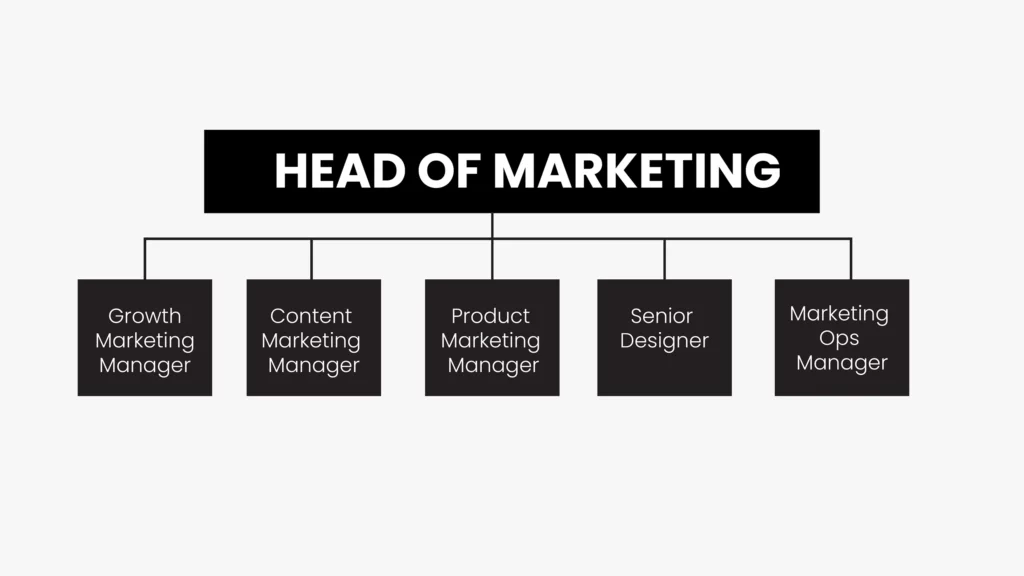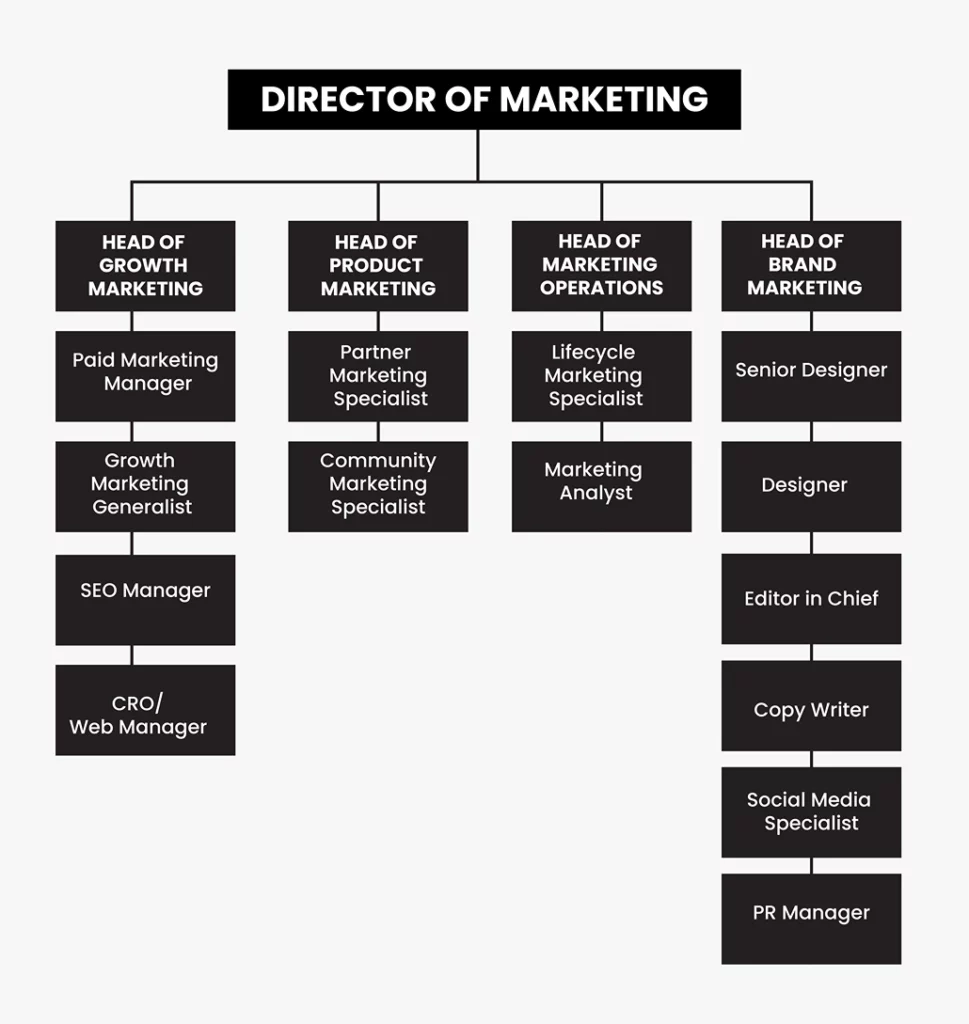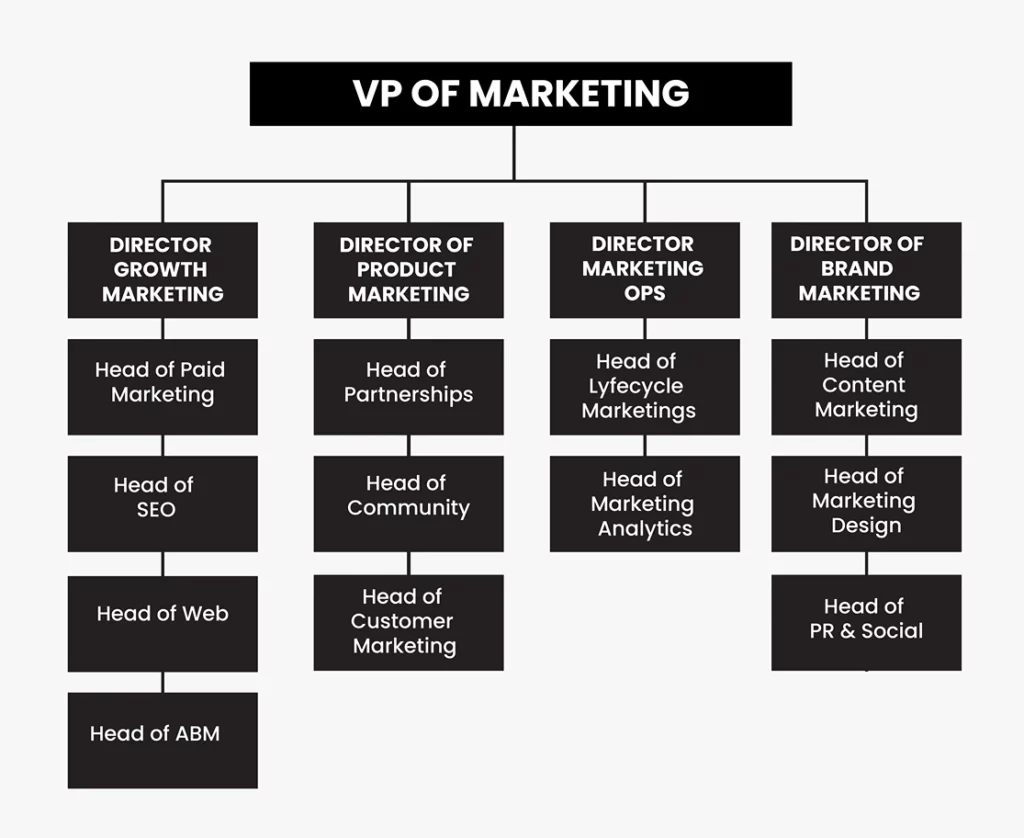TL;DR – Executive Summary
This guide explains how to build and grow an effective startup marketing team based on your company’s stage and resources. It’s designed for early-stage founders, marketing leads, and hiring managers who need clear, actionable advice.
Here’s what you’ll learn:
- The difference between how startups and large companies approach marketing—and why startup teams need to stay flexible.
- How to structure a marketing team for small, medium, and larger startups, including example roles and responsibilities.
- A breakdown of essential positions such as Marketing Lead, Growth Marketer, SEO Manager, Social Media Manager, and Email Marketing Manager.
- A hiring roadmap to help you decide when to bring in each role.
Practical tips on budgeting, choosing marketing tools, and avoiding common hiring mistakes.
Starting a startup business is an exciting adventure that often requires careful planning and execution. One crucial pillar of any startup is its marketing strategy. A strong startup marketing team structure can be the key to success for any new company.
So, how do you set up a proper marketing team for your startup?
Don’t worry; in this article, we will discuss how to build the ideal startup marketing team in terms of structure, essential roles, and specialization.
Understanding Startup Goals and Objectives
Startups are challenging ventures that require an in-depth understanding of the company’s core requirements and objectives.
This journey is characterized by the need to develop a strong market presence, captivate the right audience, and fuel growth. With this understanding, you will be able to create a marketing team that is not only effective but also aligned with the vision and goals of your startup.
A well-structured startup marketing team is essential for startup success. The concept of understanding and structuring an effective startup marketing team goes beyond filling roles. When you begin with a clear understanding of your startup’s needs, build a marketing team that exceeds your startup growth expectations.
Startup vs. Corporate Marketing Comparison
Marketing in startups and large corporations operates in two very different worlds. While both aim for growth and success, the paths they take often couldn’t be more different.
| Startup Marketing | Corporate Marketing |
|---|---|
| Highly flexible with quick decision-making, startups can shift and adjust marketing campaigns rapidly. | Slower due to bureaucratic processes and requires multiple approvals for changes, which can delay execution. |
| The budget is limited, so creative, cost-effective strategies (content marketing, organic SEO) are prioritized. | Larger budgets allow for big campaigns, paid advertising, and global outreach but require detailed ROI tracking. |
| Startups often test bold and innovative ideas to stand out in the market. | Corporations rely on proven, low-risk strategies to protect their established brand image. |
| All the team members wear multiple designations and collaborate on various marketing tasks. | Specialized roles with distinct departments (e.g., SEO, content, brand). |
| Primarily focused on growth, user acquisition, and building brand awareness quickly. | Collaboration is less frequent, with teams working independently. |
What Are the Common Mistakes Startups Make When Building a Marketing Team?
Before building your marketing team, it’s important to understand the mistakes that often prevent startups from seeing real results. Here are the most common pitfalls:
- Hiring too late or too early
Startups often wait until growth stalls before hiring marketers, or hire too early without clear goals. The right time to hire is when you have a clear understanding of your product-market fit and a need to build demand consistently.
- Over-indexing on generalists or specialists
Early teams need flexible marketers, but hiring only generalists limits long-term performance. On the other hand, hiring niche specialists too soon can lead to underutilized talent. Start with 1–2 hybrids who can wear multiple hats, then specialize gradually.
- No alignment with company goals
Many startups build teams based on what competitors are doing, not on their own growth stage, channels, or user acquisition needs. Your first hires should directly support your most urgent business objectives, whether that’s demand generation, SEO, or product marketing.
- Ignoring content and SEO early on
Founders often focus on paid ads or sales and delay content and SEO. This leads to missed compounding benefits of organic growth. Even a lean team should include someone responsible for foundational SEO and content strategy.
- Lack of clear ownership
When everyone is “kind of doing marketing,” no one is truly accountable. Define clear ownership for key functions: content, growth, social, and analytics. Even in small teams, this clarity improves execution and decision-making.
How To Structure A Winning Startup Marketing Team
The structure of a SaaS marketing team is crucial for the success of any SaaS business. It ensures that each team member brings unique value and contributes to the organization’s growth. The structure varies depending on the company’s growth stage, marketing strategy, and overall growth plan.
Here’s how to structure marketing teams for small-sized, medium-sized, and large-sized startups on a platform dedicated to SaaS marketing.
Small-sized Startup Marketing Team
In a small-sized startup marketing team, resources are often limited, and the focus is on establishing a market presence and beginning to scale. The marketing team is typically small, and members may wear multiple hats.
A successful small-sized SaaS marketing team might include:
- Head of Marketing: A generalist with a broad understanding of various marketing disciplines. This person should be capable of strategic planning and execution across different marketing channels.
- Content Creator/Manager: Content is crucial for organic growth, SEO, and establishing thought leadership. This role focuses on producing high-quality, relevant content that resonates with the target audience.
- Creative Graphic Designer: Visual content is critical to engaging potential customers. A designer supports the team by creating graphics for social media channels, blog posts, and other marketing platforms.
- Marketing Operations Manager: This role focuses on the tools and processes that enable the marketing team to function efficiently. They ensure that campaigns are executed smoothly and that data is collected and analyzed for insights.

When working in a small team, it is essential to prioritize collaboration and flexibility. These two factors are crucial for the success of the team and for achieving the desired outcomes. Each member must be willing to contribute beyond their primary role, and the team structure should be flat to encourage open communication and decision-making.
Medium-sized Startup Marketing Team
As the startup grows, the marketing team expands to include more specialized roles. The team’s structure becomes slightly more hierarchical, but maintaining flexibility remains essential.
- Brand Marketing Manager: Responsible for building and maintaining the startup’s brand identity. This role focuses on storytelling, public relations, events, and partnerships to build brand awareness and engagement.
- Product Marketing Manager: Works closely with the product team to develop messaging and positioning that highlight the product’s unique value propositions. They are also responsible for launching new features and products to the market.
- Growth Marketing Manager: Focuses on demand generation through various channels, including paid advertising, email marketing, and SEO. This role is data-driven, with a strong emphasis on measuring and optimizing marketing ROI.
- Customer Success Liaison: Although not always considered part of the marketing team, a role focused on customer success is crucial for understanding customer needs and feedback, which informs marketing strategies and product development.

This structure supports more targeted marketing efforts and begins to segment the team based on specific functions, such as brand building, product marketing, and growth.
Large-sized Startup Marketing Team
In a large-sized startup, the marketing team is well-established and highly specialized. The team may be divided into several departments, each with its head and specialized roles underneath. This structure supports comprehensive marketing strategies that target different stages of the customer journey, from awareness to retention.
Key departments and roles might include:
- Head of Marketing: Oversees the entire marketing department, setting strategy and coordinating efforts across teams.
- Demand Generation Team: Includes roles such as SEO specialists, paid acquisition experts, and email marketing managers focused on generating leads and driving conversions.
- Product Marketing Team: This team comprises product marketing managers, market researchers, and UX writers who ensure that the product messaging is clear, compelling, and consistent across all touchpoints.
- Content Team: Consists of content strategists, writers, and editors who produce a variety of content types aimed at educating, engaging, and converting the target audience.
- Brand and Communications Team: Includes PR managers, social media managers, and brand strategists who work on building and maintaining the company’s public image and engaging with the community.
- Marketing Operations and Analytics: Focuses on the infrastructure that supports marketing activities, including marketing automation tools, CRM systems, and data analysis for insights and optimization.

Core Roles of a Startup Marketing Team
If you are building your startup marketing team, the main thing around this is building the perfect marketing team. You have to understand the core components of a startup marketing team and their roles and responsibilities as per your requirements.
It’s better to divide your marketing team into different roles so that you can speed up your startup growth. So hiring talented people as per the roles and responsibilities is the first thing that you have to do in your startup.
1. Marketing Lead
As we are talking about the marketing team structure, you need the head of this department, which is the Marketing Lead.
This team lead will work and collaborate with the account managers, sales team, and another junior marketing team to set up different strategies that can help the company grow over the competitors.
- Develop a marketing strategy that aligns with your marketing goals. That comes with identifying target markets, setting marketing objectives, and determining the best channels for audience engagement.
- Management of the brand’s identity by ensuring consistency across all marketing materials and channels. The marketing lead ensures that the brand message resonates with the target audience and differentiates the startup from its competitors.
- Building, managing, and mentoring the marketing team. This includes hiring for key positions, setting clear goals, and fostering a collaborative and innovative work environment.
- Working closely with other departments, such as sales, product development, and customer service, to ensure a cohesive approach to market the startup’s offerings effectively.
- Regularly analyzing marketing data to assess the effectiveness of marketing strategies and campaigns. This includes monitoring key performance indicators (KPIs), such as website traffic, lead generation, conversion rates, and ROI.
2. Growth Marketer
A growth marketer is known as the blend of marketer, data analyst, and product manager all rolled into one. They are responsible for identifying the practical ways that can help you in your startup business.
They have to increase brand awareness or generate leads through marketing by approaching the best strategy.
- They continuously test across various channels and segments of the customer journey. They can discover what strategies yield the best results. This could involve A/B testing landing pages and experimenting with email marketing campaigns. They also try to get new user acquisition channels.
- Data is the compass that guides a growth marketer’s decisions. They dive deep into analytics to understand user behavior, campaign performance, and market trends.
- Growth marketers often work at the intersection of marketing, product development, and sales. They collaborate with product teams to improve user experience and retention. With marketing, refine messaging and strategies to ensure leads are effectively converted.
- They leverage customer feedback and behavior data to inform product improvements and messages. And aim to deliver value and build strong, lasting relationships with the customer base.
Suggested Read: Top Growth Marketing Agencies For SaaS Startups
3. SEO Manager
A growth-led SEO service helps with cost-effective marketing methods that help you to get sales and leads quickly. So, having a good SEO lead is a must-have in a start-up marketing team.
- Develop and implement an SEO strategy tailored to the company’s objectives. That focuses on maximizing organic search visibility, website traffic, and user engagement.
- Conduct good keyword research to identify keywords. Also, they have to ensure their strategic incorporation into website content. It also includes metadata and URLs for optimal search engine ranking.
- Regularly perform technical SEO audits to identify and rectify website issues. That includes site speed, mobile responsiveness, and crawl errors.
- Collaborate with content creators to guide the development of SEO-friendly content. That resonates with the targeted audience and adheres to best practices. Thus, it enhances both ranking and user experience.
- Monitor, analyze, and report on SEO performance metrics tools like SuiteJar, Google Analytics, or GSC. Also, make decisions to refine and improve the SEO strategy continually.
Suggested Read: Best SaaS SEO Agencies For Startups
4. Social Media Manager
The social media manager is the head of a social media marketing service. They will help shape the company’s online presence and engagement with the audience.
- Content Creation and Strategy Implementation
Develop and execute a compelling content strategy across social media platforms. Creating this with the brand’s identity, goals, and audience preferences. That will ensure consistent and engaging communication.
- Community Engagement and Management
Actively engage with the brand’s online community by responding to comments, messages, and reviews. Positive interactions and building relationships with followers enhance brand loyalty.
- Analytics Monitoring and Reporting
Tracking, analyzing, and reporting on social media performance metrics. That helps in the effectiveness of strategies and social media campaigns.
- Trend Monitoring and Adaptation
Tracking the latest social media trends, platform updates, and best practices. And adapting strategies as necessary to maintain the brand’s relevance and engagement levels.
- Crisis Management and Response
Monitor social media channels for potential crises or negative feedback affecting the brand. Then, develop and implement strategies to mitigate any adverse impact on the brand’s reputation.
5. Email Marketing Manager
Email Marketing Manager will leverage email as a powerful marketing channel to drive the company’s objectives. This role involves strategizing, executing, and optimizing email marketing campaigns. It will engage with audiences, nurture leads, and drive conversions and revenue growth.
- Email Marketing Strategy Development
Design and implement email marketing strategies with the company’s marketing goals. Always focus on segmentation, personalization, and automation to enhance engagement and conversions.
- Campaign Management and Execution
Creating, scheduling, and sending email campaigns. That includes promotional emails, newsletters, and transactional messages. That ensures timely delivery and relevance to various subscriber segments.
- Performance Analysis and Optimization
Closely monitor and analyze the performance of email campaigns. By checking the key metrics such as open rates, click-through rates, conversion rates, and ROI. Use insights to optimize future campaigns for better performance continuously.
- List Management and Growth
Manage the email subscriber list, including segmentation, maintenance, and cleansing. And practice to ensure a high-quality, engaged audience. Implement strategies for list growth and minimize churn rates. If you are overwhelmed by email marketing strategies, consider hiring a cold email outreach agency for your startup.
- Compliance and Best Practices
Ensure all email marketing activities comply with legal regulations (e.g., GDPR, CAN-SPAM Act). Stay updated on email marketing trends and technologies. It helps in maintaining effective and ethical email marketing programs.
Also Read: Increase Your ROI With Effective Email Marketing
Conclusion
In conclusion, getting your startup team structure right is crucial for success. We’ve covered different structures to help guide you in setting up your team effectively.
If you find marketing overwhelming, know that you’re not alone. Collaborating with a growth marketing agency such as growth.cx can provide you with the strategies you require minus the stress. They stand prepared to assist your startup in flourishing through effective strategy and execution.
FAQs
2. What is the best startup structure?
A flat startup organizational structure works best. It eliminates layers of hierarchy, promotes direct communication, and allows for faster decision-making that helps in growth and innovation.
3. What should a startup team consist of?
An organization’s startup team typically consists of a CEO and a Chief Technology Officer (CTO). The CEO guides the startup’s mission, growth, and culture, while the CTO manages the company’s technical strategy, oversees product development, and builds the company’s technical team.




